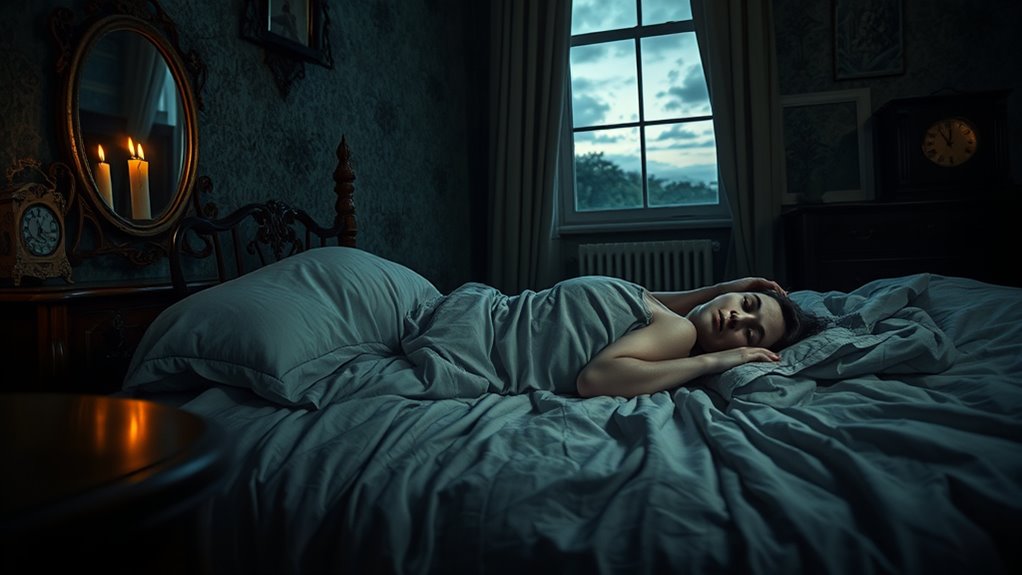You can’t truly die in a dream because your mind treats death as a temporary story rather than a permanent end. During sleep, your brain creates scenarios where death happens, but it’s not real and doesn’t cause lasting harm. Even in nightmares, you remain safe inside the dream world, and you can often control or change frightening situations if you realize you’re dreaming. If you’re curious about how your mind handles these scenarios, there’s more to discover.
Key Takeaways
- Dream death is a temporary event within the dream, not a real or permanent death.
- Recognizing a dream as a dream (lucid dreaming) allows control and prevents real harm.
- Intense nightmares may feel real but do not cause actual physical danger or death.
- The brain treats death in dreams as part of the story, not an actual threat to life.
- Awareness during dreams helps distinguish them from reality, ensuring safety despite frightening scenarios.

Have you ever wondered if you can really perish in a dream? It’s a question that often sparks curiosity, especially for those interested in lucid dreaming. When you’re aware that you’re dreaming and can control your actions, you might think about pushing the boundaries of what’s possible—like experiencing death within the dream. But the truth is, even during intense nightmare scenarios, your mind knows you’re safe. Lucid dreaming allows you to recognize that you’re in a dream state, which often helps you steer away from frightening or dangerous situations. So, even if you find yourself in a nightmare that feels like death, your conscious awareness keeps you grounded, preventing any real harm.
In lucid dreaming, you have a unique power: the ability to manipulate your dream environment. If a nightmare scenario becomes too intense—say, feeling like you’re falling to your death—you can often realize it’s just a dream and change the outcome. Many lucid dreamers report transforming frightening scenes into more pleasant ones, or simply waking up. This control diminishes the likelihood of experiencing true death in a dream because your conscious mind recognizes it’s all a fabrication. Appliance maintenance routines and preventive care can also help extend the lifespan of your devices, much like how lucid dreaming techniques help prolong control over your dreams. Many appliances, especially those with advanced connectivity options, are designed to be safe during sleep and routine use. The fear and adrenaline in nightmare scenarios can be vivid, but they don’t translate into actual danger. Your brain, during REM sleep, constructs these scenarios to evoke emotion and simulate danger, but it’s all within a safe, internal space.
In lucid dreams, you can recognize and change frightening scenarios, reducing the risk of experiencing true danger or death.
It’s important to understand that dreams don’t work like real life—your mind doesn’t interpret death as final when you’re asleep. Instead, it treats it as part of the narrative, a temporary event that ends when you wake up. Even in the most terrifying nightmares, your brain is aware that it’s just a story, which is why death in dreams rarely feels permanent or real. This awareness is especially true if you’ve practiced lucid dreaming techniques. Once you realize you’re dreaming, you can often escape or avoid the worst parts of nightmare scenarios altogether.
Ultimately, while your subconscious might conjure up scenarios where you ‘die,’ your conscious mind remains in control, and your body remains safe. Dream death isn’t real, and your mind’s ability to distinguish between waking and sleeping states ensures you’re not truly in danger. So, even if you encounter a nightmare scenario where death seems imminent, remember: it’s just a story, and you have the power to change it or wake up.
Frequently Asked Questions
Can Recurring Dreams Indicate Death in Real Life?
Recurring dreams don’t necessarily indicate death in real life. Instead, they often reflect your subconscious fears or unresolved issues through dream symbolism. These dreams might highlight stress, anxiety, or emotional struggles you’re facing. Pay attention to the themes and feelings during these dreams, as they can help you understand what’s bothering you. Addressing these fears in waking life can reduce the frequency of recurring dreams and provide clarity and relief.
Do Nightmares Increase the Risk of Death?
Nightmares don’t directly increase your risk of death, but they can cause stress and sleep disturbances. During nightmares, you might experience sleep paralysis or even lucid dreaming, which can be unsettling. These episodes can lead to poor sleep quality over time, affecting your health. While nightmares aren’t deadly, managing stress and practicing good sleep hygiene can help reduce their frequency and improve your overall well-being.
Is There Scientific Evidence Linking Dreams to Mortality?
Scientific evidence linking dreams directly to mortality is limited. While lucid dreaming and sleep paralysis can cause intense experiences, they don’t increase your risk of dying. These phenomena involve altered consciousness but don’t threaten your life. Researchers haven’t found proof that dreaming, even in vivid or frightening forms, leads to death. So, you can rest assured that your dreams, including lucid ones and episodes of sleep paralysis, aren’t connected to mortality risks.
Can Dreaming About Death Cause Long-Term Trauma?
Dreaming about death can feel like a hurricane tearing through your mind, but it usually doesn’t cause long-term trauma. If you experience sleep paralysis or practice lucid dreaming afterward, it might leave you feeling shaken or anxious, yet most recover quickly. Your mind’s resilience is stronger than you think, and with proper support, these intense dreams won’t haunt you forever. Remember, your subconscious is just processing your fears, not predicting your fate.
How Do Cultural Beliefs Influence Perceptions of Dying in Dreams?
Your cultural beliefs greatly shape how you perceive dying in dreams, often through symbolic interpretations rooted in cultural symbolism. If your culture views death as a shift or rebirth, you might see a dream about dying as positive or transformative. Conversely, cultures that associate death with loss or fear can cause you to interpret such dreams as warnings or bad omens. These beliefs influence your emotional response and understanding of the dream’s meaning.
Conclusion
As you drift back from the dream world, remember that dying in a dream is just a fleeting shadow, a brief flicker of darkness that quickly dissolves with the dawn. Picture yourself waking up, sunlight spilling through the window, warmth wrapping around you like a comforting blanket. In the end, dreams may test your fears, but they can’t hold you. You’re safe in the real world, where every new day is a fresh start, full of endless possibilities.









